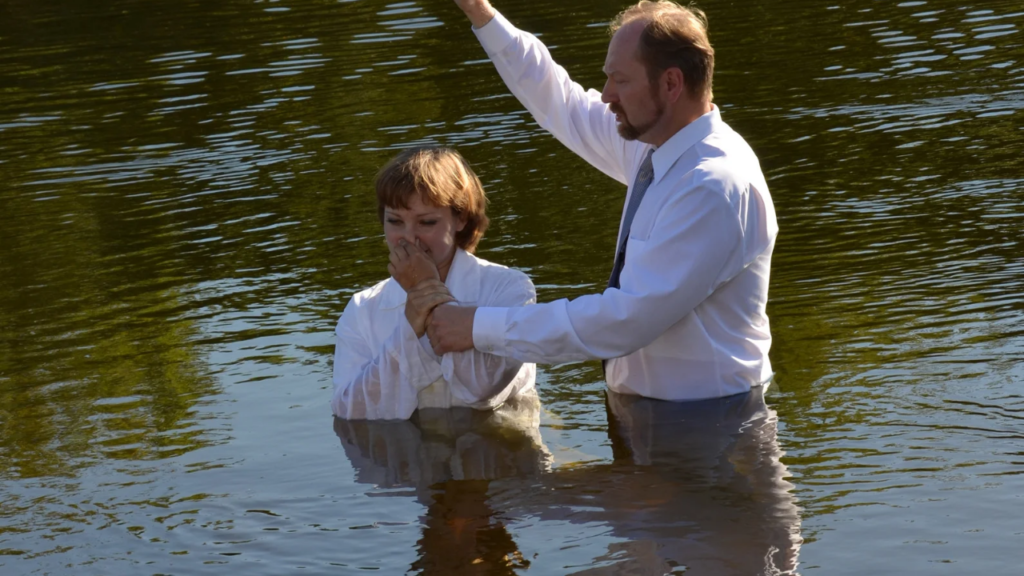Which is the right kind of baptism?
Who should be baptized?
Who should baptize?
Is baptism important?
What if I don’t want to be baptized?
What will happen to those who died without ever being baptized?
Should children be baptized?
Questions galore! Right?
Why are we writing about believers’ baptism?
As a Christian couple working among the youth, these are some of the questions we often receive when discussing baptism.
From our study of the Scriptures on the topic, I decided to write this post to respond to these questions and share all that we have learned about baptism from the Scriptures.
I pray that you will be enlightened and helped to make a well-informed Biblical stand on baptism as you read.
Let’s get right into the main subject of the post.
The Beginnings of Believers’ Baptism
When the New Testament begins, we read about the fulfillment of prophecy about the coming Messiah, the Lord Jesus Christ, who would save the world from sin.
The Gospels also tell us that John the Baptist came on the scene as part of God’s ordained plan to prepare the way for the coming Messiah.
John baptized those who came to him when they heard his message of repentance.
When asked who he was, John replied:
“I am the voice of one calling in the wilderness, ‘Make straight the way for the Lord.” (John 1:23)
John the Baptist was the Forerunner of Jesus the Savior.
The Baptism of Jesus
Just before Jesus began his earthly mission, he came to the Jordan River to be baptized by John.
John knew who Jesus was, the Son of God. He even wanted to refrain from baptizing the holy One of God. This is what Jesus told him:
“Let it be so now; it is proper for us to do this to fulfill all righteousness.” Then John consented.” (Matt.3:15)
John, therefore, baptized the Lord Jesus Christ.
Biblical Baptism for would-be followers of Jesus
When Jesus completed his God-ordained mission on earth, he left his disciples with these words:
“Therefore go and make disciples of all nations, baptizing them in the name of the Father and of the Son and of the Holy Spirit, and teaching them to obey everything I have commanded you. And surely I am with you always, to the very end of the age.” (Matt 28:19-20)
“Go into all the world and preach the gospel to all creation. Whoever believes and is baptized will be saved, but whoever does not believe will be condemned.” (Mark 16:15)
Notice that the word Baptism appears in the 2 Scriptures.
Part of the requirement for people becoming followers of Jesus was to be baptized.
Baptism in the Book of Acts
As Acts begins, Jesus tells his disciples to tarry in Jerusalem until he sends the promised Holy Spirit. (Acts 1:4-5)
God fulfilled his promise. The Holy Spirit came on the disciples and those who tarried in the upper room. They spoke in other tongues as the Spirit enabled them. (Acts 2:1-4)
This strange phenomenon attracted the attention of God-fearing Jews from every nation who were staying in Jerusalem.
Peter stood up with the eleven disciples and boldly preached Jesus to the gathered crowd in Jerusalem. He explained from the Old Testament that Jesus is their promised Messiah.
Peter went on to clarify why Christ had to suffer, die, be buried, and rise from the grave to save us.
When Peter explained that repentance and forgiveness of sin would happen through Jesus Christ, the response from the inquirers is worth noting. The Bible says the people were cut to the heart. They asked:
“Brothers, what shall we do?” (Acts 2:37b)
Peter replied:
“Repent and be baptized, every one of you, in the name of Jesus Christ for the forgiveness of your sins. And you will receive the gift of the Holy Spirit. The promise is for you and your children and for all who are far off—for all whom the Lord our God will call.” (Acts 2:38-39)
The Bible says that those who believed were baptized and about three thousand were added to their number that day. (Acts 2:41)
Baptism in the Bible is Part of a Process
Baptism is part of a Christian’s new birth into God’s kingdom.
Baptism was so important that when Paul found 12 men who had received John’s baptism, he explained to them that John’s baptism was a baptism of repentance. He told them that John told the people they were to believe in the one who would come after him – Jesus.
When they heard this, they were baptized into the name of the Lord Jesus Christ. Paul placed his hands on them and they received the Holy Spirit. (Acts 19:1-7)
Once a convert had repented and believed in the Lord Jesus, baptism was an outward sign of the inward reality of what had happened to the convert. (Acts 10:47, 19:5)

Baptism meant the one being baptized could identify with Jesus in his death and burial as they went into the water, and with his resurrection as they came up out of the water, resurrecting in the newness of life with Christ. (Romans 6:3-4)
Is it no wonder when Philip was baptizing the Ethiopian Eunuch, they went down into the water and then up out of the water? (Acts 8:38-39)
Peter further exclaimed in 1Peter 3:21:
“and this water symbolizes baptism that now saves you also—not the removal of dirt from the body but the pledge of a clear conscience toward God. e It saves you by the resurrection of Jesus Christ…”
Baptism saves us. Remember that you and I don’t get baptized to gain salvation. Baptism saves us because it is part of the process of salvation as we discussed earlier.
Baptism in itself, devoid of repentance and faith, is nothing. It is equal to going into the water a dry sinner and coming out a wet sinner.
Baptism rubber-stumps God’s work being done in our hearts when we repent and believe.
When one has been baptized, that’s when they can say with Paul:
“I have been crucified with Christ and I no longer live, but Christ lives in me. The life I now live in the body, I live by faith in the Son of God, who loved me and gave himself for me.” (Gal.2:20)
Baptism is an important component of our salvation in Christ. Jesus commanded those who would believe in him to be baptized.
Who should be baptized?
From our discussions, only a person who consciously decides to follow Jesus by repenting their sins and believing in the Lord Jesus should be baptized.
Baptism does nothing for one who hasn’t decided to follow God wholeheartedly.
Baptism is not:
- Part of a membership process to join a particular church denomination.
- A guarantee for entry into heaven in and of itself when one dies.
Let me reiterate that it is part of the process of entry into God’s kingdom.
What about children, can they be baptized?
God loves little children. Jesus embraced them telling his disciples and those around him not to hinder the little children from coming to him. He went on further to say the kingdom of heaven belongs to such as these. (Matt.19:13-14)
We have already said baptism is not the ticket to heaven. Rather, baptism is a vital part of the process of salvation in Christ. Salvation in Christ, also called being born again, and faithfulness to Jesus to the very end, is the ticket to heaven.
When a child has not realized that they are a sinner and in need of the Savior, why are we now imagining that our little children’s ticket to heaven is for us to ensure they are baptized? Baptism is not a ticket to heaven.
Why would God send little children to hell because they were not baptized in water?
Why would we decide to “create” a way of making sure that our children get into heaven by baptizing them?
Baptism is for those who have repented and believed.
Let’s entrust our children to God who loves little children. Let’s not create a doctrine around the salvation of little children to secure their eternity.
Our preoccupation should be to train our children in the way they should go. We should raise them as godly offspring.
We should constantly look out for God-ordained opportunities to lead a child to the Lord when we discern that they are beginning to understand good and evil and the implications of this.
Once they understand they are a sinner, lead them to the Lord. Disciple them in the truths of the faith, including the believers’ baptism. Let them make a conscious decision to be baptized. Only then can we baptize such a child.

What will happen to those who died without ever being baptized?
For those who die, if they repented and believed in the Lord Jesus, just like the thief on the cross, who Jesus promised would be in paradise with him, they will be in heaven.
Let me however add this disclaimer.
When we understand the truth about the process of salvation, it is God’s will that we obey and get baptized.
Jesus said if we love him, we will obey what he commands. (John 14:15?)
In the time of ignorance, when we don’t know the truth yet, we will not be judged for the truth we don’t know. We will be judged for the truth we knew but chose to disobey.
Look at this case in point:
In Acts 19:1-7, a passage we referenced, Paul met 12 men at Ephesus. The Bible records these were disciples. A disciple is a follower of Jesus.
These 12 men were already walking with Jesus and living for him. If not, they wouldn’t be called disciples.
When Paul explained the way of salvation more adequately, the Bible records their immediate response. They were baptized into the name of the Lord Jesus.
Many of us who might be reading this post have come from religious backgrounds. Some of the churches we come from didn’t teach the truth adequately. That’s my story too. I’ll share my story as we end this post.
We often learn the truth about salvation as we continue our Christian faith. Thank God salvation is a process. Once you receive and comprehend the truth, obey it. In this case, once you understand the whole truth about baptism, you should get baptized as soon as possible.
If you however repent and believe but don’t get the opportunity to be baptized and you die, I believe you’ll go to heaven. You were willing to obey God’s Word.
God is not a sadist who awaits every available opportunity to send us to hell. God is a loving God who is not willing that any man should perish. His wrath is reserved for the rebellious, disobedient, wicked, and the devil and his demons.
What if I was baptized before, should I be baptized again?
Your baptism meant nothing if you had not repented and believed in the Lord Jesus.
Baptism brings your repentance and faith to completion.
Get baptized, this time, with a clear understanding of what God is accomplishing in you because you have repented your sins to God and put your faith in Jesus.
If you got baptized after repenting your sins and believing in Jesus, you don’t need to be baptized.
Is baptism by sprinkling the right kind of baptism? Which is the Right Mode of Baptism?
From our discussion, as we looked at baptism from the Scriptures, I’m reminded of two verses specifically:
“Now John also was baptizing at Aenon near Salim, because there was plenty of water, and people were coming and being baptized.” (John 3:23)
John used to baptize in plenty of water. He must have baptized Jesus the same way. There was no reason for John to baptize the Lord any other way.
“And he gave orders to stop the chariot. Then both Philip and the eunuch went down into the water and Philip baptized him. When they came up out of the water, the Spirit of the Lord suddenly took Philip away, and the eunuch did not see him again, but went on his way rejoicing.” (Acts 8:38-39)
Philip and the Eunuch went down into the water then up, out of the water after Philip baptized him. If they had to go down then up, this wasn’t little water. This was a lot of water.
We also discussed baptism in light of the death, burial, and resurrection of Jesus.
Paul asks this question:
“Or don’t you know that all of us who were baptized into Christ Jesus were baptized into his death?” (Rom.6:3)
Can baptism by sprinkling bring to light the implication of baptism in these Scriptures? By all standards, no.
When I picture Romans 6:3 in my mind, I can’t help but picture a complete covering with water equated to a burial.
“We were therefore buried with him through baptism into death in order that, just as Christ was raised from the dead through the glory of the Father, we too may live a new life.” (Rom.6:4)
Just as a dead person is buried by being covered completely with soil, so are we covered completely with water. When we come up out of the water, we experience a resurrection to the new life in Christ. I don’t see how sprinkling can be equated to the action explained in this verse.
When John baptized Jesus in plenty of water, Jesus became our example. Why would Jesus let his followers choose a different way of baptism?
This question reminds me of a story in the Old Testament in Jeremiah 35. The Recabites, who were the descendants of Jonadab son of Recab, wouldn’t drink wine because their forefather Jonadab had forbidden them to.
If these men obeyed a mere mortal and got commended by God, why wouldn’t we, the followers of the risen Christ, the Son of God, follow in his footsteps as to the mode of baptism, in obedience to his command?
As to how those who come from places with little water should obey, let’s leave that to God. He will show them how to act in their context. Or else, we might fall into the legalism trap of defining how people should act and setting that as the standard. Let’s stick to what has been revealed in Scripture.
It’s also my humble submission that when we stray from the main path revealed in Scripture and instead, begin to scratch our heads about what to do with exceptions, we’re walking a dangerous path that might lead toward error.
Finally, the Greek meaning of the word baptize, which was transliterated from the Greek word baptizo means to immerse.
The English meaning of the word immerse from the Google dictionary is to dip or submerge in a liquid.
The Google dictionary meaning of the word transliterate is to write or print (a letter or word) using the closest corresponding letters of a different alphabet or script.
I suppose one of the reasons words are transliterated is to help future generations preserve the original meaning of the word as closely as possible.”
I hope you can see how baptism (or immersion ) describes the action in the Bible called baptism.
Who should baptize?
Essentially, an older mature believer who leads another to the Lord should adequately explain to the believer the way of salvation. They should then baptize them.
There is no requirement that only a pastor, bishop, or denominational leader can baptize.
Due to the realities of our time such as the presence of the local church leadership and ordained clergy, and in some scenarios, specially prepared places where baptism is done, the work of baptizing new believers and those who need to be baptized has been assigned to the ordained clergy and leaders of the church which is okay but it is not a requirement.
The other reason is to bring some form of order to the church. This might mean baptizing those who’ve believed or got saved on a particular day together rather than baptizing individuals every time they get born again.
Scripturally though, every time someone believed, having understood the implication of their decision, they got baptized immediately.
A case in point is the story of the Ethiopian Eunuch. Once he understood the message of the gospel and asked to be baptized, Philip responded. He baptized him immediately.
My Story Concerning Believers’ Baptism
Let me share my story concerning baptism before I sign off.
I grew up in a Christian home. We belonged to a certain local Pentecostal church and actively participated in church activities.
As was the custom at this church, when a child completed Primary school, they would get baptized.
My parents thought my 2 siblings and I would be baptized because we were of age. (My twin sister and I were 14yrs. Our younger sister was 10)
During the week following the baptism day, we were taught the basics of the faith.
A day before baptism, those who would be baptized and the leaders went for Kesha (Overnight church service) in the church.
Part of what we did during the Kesha was to ask God to forgive us for any sins we had committed. We did our best. The next day, we got baptized. (in a river)
From then on, I thought I was good to go as a good Christian. I didn’t need anything else. My life though, continued as before.
The next year, I joined High School as a boarder. I joined the Christian union as a member.
To cut a long story short, I heard the gospel preached in a way I’d never perceived before. For the first time, I understood I was a sinner in need of God’s saving grace.
Following this understanding, I repented my sins to God and trusted Jesus as my Lord and Savior.
In the weeks and months that followed, my immediate family and friends saw a marked transformation in me. I was grateful to be a child of God.
Now came baptism. I inquired from relevant authorities and friends especially from my church background whether I needed to be baptized again. I was told that one should never be baptized twice. I was already baptized. God understood the ‘repentance’ I engaged in during that vigil. I was satisfied with the answer.
I then embarked on a journey of walking with God through the Scriptures. The more I read the Scriptures, the more I understood I needed to be baptized again. The more I understood this, the more I inquired. I got the same answer: The previous baptism was sufficient.

This was a struggle that lasted about 7 or so years.
But God is gracious. He connected me with a dear couple that later walked with me in a discipleship relationship for several years.
When we first connected, the lady gave me a videotape of the New Birth to listen. I listened. For the first time, I fully understood the process of salvation.
The doctrine of baptism, most of which I’ve shared in this post, became so clear that the moment I heard that a baptism would be conducted at a neighbor’s Bible-believing local church, I requested to be baptized. I enrolled for baptism.
I got baptized about 7 years after I believed in Jesus.
I didn’t have to wait for 7 years to be baptized. I shouldn’t have been baptized before I met the Lord Jesus.
If only I had known the truth! The truth would have made me free. This is part of the reason why I share this information.
Someone else doesn’t have to wait like I did. They can come across this post, check the Scriptures to see whether what I’ve written is the truth, and embrace the truth, and the truth will make them free.
Is baptism that significant, therefore?
Not only is baptism important because we are obeying the Lord Jesus, but it is also important because of what it stands for and signifies.
Baptism embodies the death, burial, and resurrection of Jesus for the believer. These three key events, (Christ’s death, burial, and resurrection) are at the heart of our Christian faith. Without them, we have believed in vain.
Baptism causes me as a child of God to identify with Jesus in his death, burial, and resurrection.
Because it is a physical event, we may be tempted not to take the spiritual significance of baptism as seriously as we ought.
Because the salvation journey is a journey of faith, we must be willing to obey God, trusting that he knows the outcome of our obedience in the spiritual realm.
Let’s not take baptism lightly. Let us obey God and be baptized the Biblical way (If we are not yet baptized as disciples) then lead others into God’s truth concerning baptism.
I reiterate that baptism is part of the process of salvation. In this post here, I have captured all the components of our spiritual foundation that explain the whole process of salvation. You’re welcome to read it too. I trust it will be a blessing.
Recommended:
Why Rising up Early is Biblical: Tracking the Proverbs 31 Woman Series
7 Reasons Why you Need to Rise up Early: Tracking the Proverbs 31 Woman Series
7 Rhythms and Routines of the Noble Woman: Tracking the Proverbs 31 Woman Series
Are there Cracks in your Spiritual Foundation? 4 Reasons Why your Spiritual Foundation is Weak
6 Components of our Spiritual Foundation

